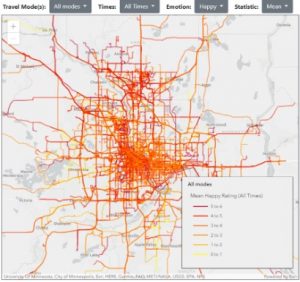Seemingly mundane data can lead to groundbreaking research. Daynamica, and Co-founder Dr. Yingling Fan, have developed technology that can collect data like never before. The company’s data collection app is helping researchers gather important data about people’s perceptions, behaviors, and emotions in the context of daily living. After going through the national NSF I-Corps program, Dr. Fan and her colleagues identified new customer segments that could benefit from their technology.

Dr. Fan got her Ph.D. from the University of North Carolina at Chapel Hill in City and Regional Planning. Her dissertation investigated how people traveled to daily destinations in cities and towns. While she was doing her research around 2007, GPS and smartphone technology was primitive, which made her research difficult.
Over time, mobile GPS technology improved. This created an opportunity to improve the data collection process. Dr. Fan and her colleagues created and patented a smartphone-human hybrid intelligence system which became the backbone of Daynamica.
“Each smartphone has a built-in GPS receiver, and at the same time, the smartphone has an interface that can allow users to self-report information. So, by combining mobile sensing with human input, smartphone-based technology has the potential of capturing many aspects of daily life.”
By using the Daynamica App to capture people’s happiness levels during daily trips, researchers were able to generate a transportation happiness map illustrating which roads and streets are more pleasant to travel to than others.
Daynamica enables researchers to gather data on users’ daily activities and well-being. This seemingly mundane data can lead to beneficial research.
“There’s a lot of researchers that were interested in our data, particularly in social science, as well as health sciences, because the data we generate is about people’s everyday life… Despite being mundane, everyday life activities are shared by most people, and play essential roles in shaping people’s health, and well-being.”
The Daynamica team participated in several I-Corps programs including MN-Corps, run by the University of Minnesota Twin Cities, and National I-Corps. Through their numerous customer interviews, they were able to discover new opportunities. Notably, Daynamica’s technology could be used to assist medical researchers to collect data about users’ wellbeing. Daynamica’s app has been used to study how the day-to-day logistics of cancer treatment affects patient well-being, how work-related activities affect medical workers’ exposure to COVID risks, and more. Recently, the company was awarded a $400,000 Small Business Technology Transfer (STTR) grant from the National Institutes of Health to continue developing its technology into digital health tools for remote patient monitoring. The I-Corps program enabled the Daynamica team to discover this exciting use for their technology.
“During (National) I-Corps, we had to stay up late and get up early to complete the required 100 customer interviews. It’s an intensive program, but also very rewarding that after that a very intensive amount of effort, that you know what to do for the next steps. So, I think it is totally worth it. I would recommend this program to any researchers who are interested in bringing their technology inventions to market.”
Interested in learning more about Daynamica and its technology? Check out their website: https://daynamica.com/
Do you have an invention or idea that you are interested in exploring the market opportunities for? Check out more information about the I-Corps program: https://www.greatlakesicorps.org/programs/

